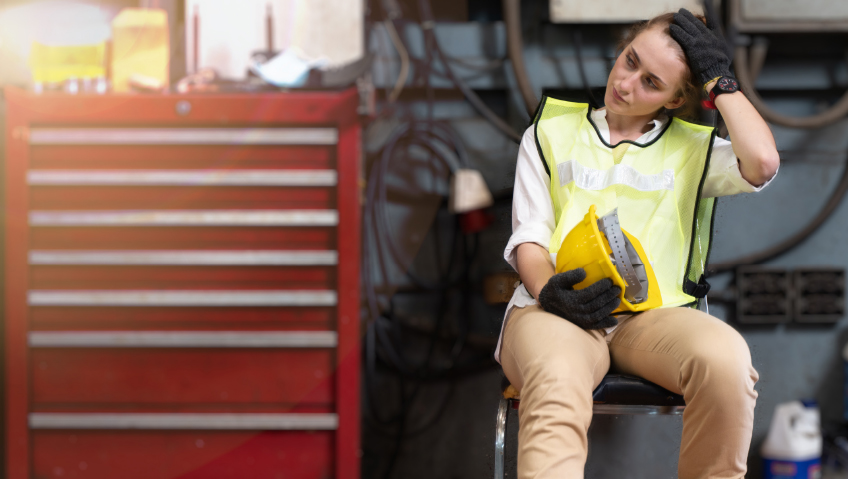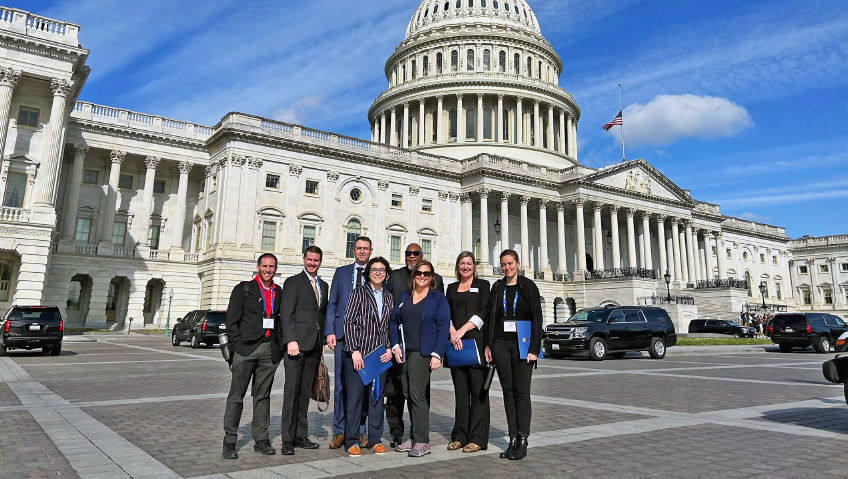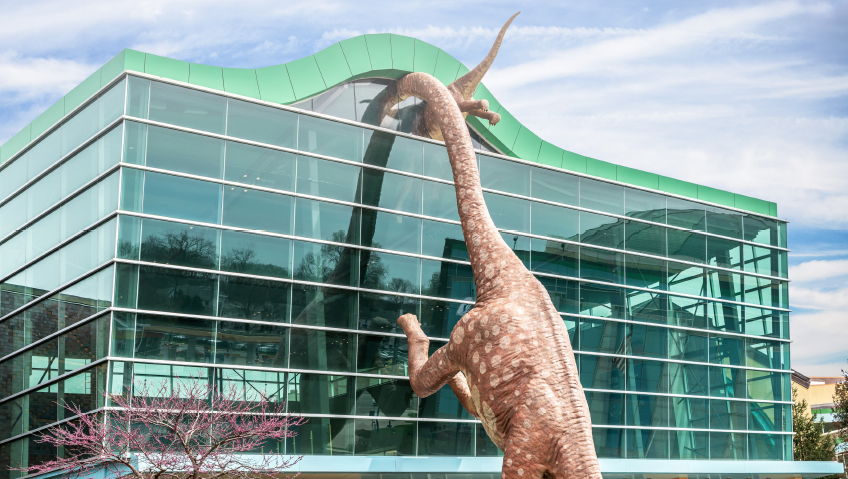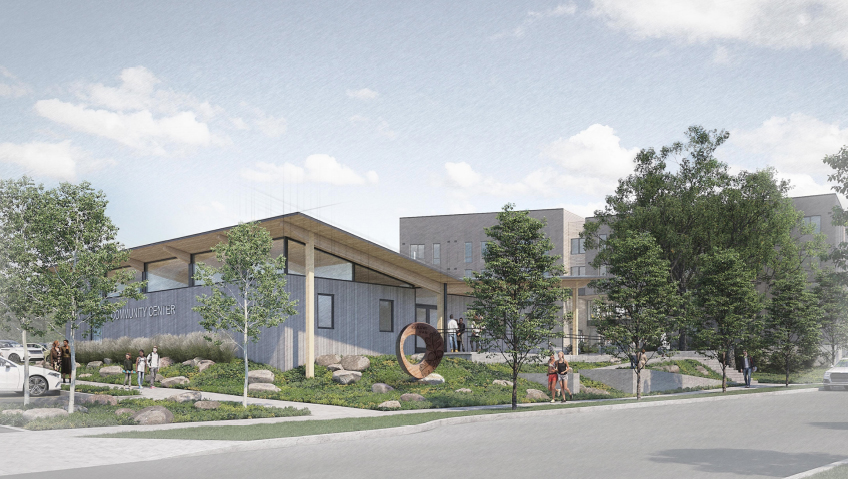Eastern Glass and Aluminum (EGA) of Norcross, Georgia, marks its tenth anniversary this year as a successful building envelope contractor. Spun off from a larger parent company, EGA excels at construction projects involving glass, glazing, roofing, and metal panels. The firm is looking to grow its market reach, enhance its in-house manufacturing capabilities, and expand a new division devoted to the sale of architectural products.
“We focus on the exterior,” says Chief Operating Officer Chris Shin. “A good part of our work is commercial, healthcare, and stadium projects. Another big part, for the glass and glazing division, are condos and mid-high rises.”
Among the company’s strengths are design and engineering, project and field management, and fabrication. Design and engineering includes design-assist, an approach in which specialists are involved in the earliest stages of the design process. Project and field management covers planning, scheduling, supply chain management—with input on procurement and field crew management—encompassing both site logistics and management, and value engineering, which includes design evaluation.
Manufacturing centers on aluminum composite (ACM) panels, aluminum doors and windows, and custom sheet metal fabrication. Fabricated wares are shipped to the client’s jobsite. EGA field crews take care of commercial roofing, glass, and metal panel installation.
As per its design-assist ethos, the company works with clients even when they have only “a rough sketch of the building,” says Shin. “We go in and speak with them about their design intent, and then we recommend what products they can use and different [solutions] that will create the system they want for their building. Once we have a clear idea of what the client wants, we start engineering the system [according to] local code requirements, window requirements, and things of that nature.”
Most of the company’s work is self-performed. “The only things we really sub-contract out are the core materials that we use,” Shin says. “We have a lot of different vendors for glass and aluminum frames and panels. Manufacturers create those things; we take those core materials, design them, and do fabrication.” For such tasks, EGA partners with manufacturers such as Kawneer, a Georgia-based business that produces aluminum curtain walls, doors, windows, and framing.
In addition to its head office, the company has a branch in the town of Front Royal, Virginia. While many projects take place in the states in which it is based, the team has also taken on assignments in Ohio, Florida, Utah, Tennessee, and Washington, D.C., among other locales. The firm will travel wherever there are “monumental projects that require its expertise,” says Shin.
“The Atlanta Braves stadium is one of the projects we’re very proud of. That was our first stadium project,” he states. “Orlando’s INTER&Co Stadium was a fun one too. That has a big logo of a lion at the main entrance. We designed that for them [it’s made up of 154 unique pieces!] and now, we’re working on a [Veteran’s Administration] hospital in Kentucky. That’s a pretty large job—around $40 million. That’s one of the bigger projects.”
EGA’s work at Truist Park—the official name of the baseball stadium that hosts the Atlanta Braves—involved a sub-roof, insulated wall panels, single-skin wall panels, faux wood panels, and soffit panels. Work at Orlando’s INTER&Co Stadium involved insulated panels, perforated panels, a sub-roof, wind screen, modular panels, and thermoplastic polyolefin (TPO) roofing.
Other prominent projects included work on sub-roofs at Chicago’s legendary Wrigley Field and Rice-Eccles Stadium in Salt Lake City, Utah, and impact-resistant glass at a Georgia-based Facebook data center. EGA has worked on storefronts, auto showroom doors, and sliding doors at the Michelin Raceway Road Atlanta as well.
Every project it undertakes is a testament to the company’s intense commitment to quality. As part of its quality assurance/quality control program, EGA thoroughly reviews and evaluates all project drawings, designs, and specifications to ensure excellence and regulatory compliance. The firm investigates quality assurance programs run by its suppliers and arranges equipment audits before and during the manufacturing process.
“We really try to have our team members in the shop understand the product and how things go together. One of the ways we found to do that is by making a story board. A story board is a step by step [depiction] of how you fabricate things. We have pictures [that show] how these things are put together,” says Shin.
The story board method is also used with installers, he adds. When a building project involves the installation of windows, EGA will conduct water tests whereby windows are sprayed with water and subjected to other physical tests to determine if they will leak under adverse weather conditions. These quality control tests are also conducted for the company’s other scopes of work.
The company takes an equally far-reaching approach when it comes to safety. Field staff and office managers are required to take Occupational Safety and Health Administration (OSHA) training, and Shin is an OSHA-certified instructor who is licensed to perform certain types of training. Staff members are required to discuss safety issues, concerns, or accidents at toolbox meetings and other opportunities.
While COVID caused massive disruptions to the economy, EGA was not hugely affected. The company’s work was considered essential, so it did not have to close down. “That allowed our people to continue working,” recalls Shin. “We had a lot of projects that were ongoing at the time, so we were able to kind of ride it out. Operationally, there were challenges; people were sick. We had to deal with not having enough manpower at times, but we took [the necessary] precautions and tried to keep everyone safe.”
EGA can trace its origins to the vision and drive of entrepreneur Peter Kim. After graduating from George Mason University in Virginia, he took a job at a roofing company run by his brother-in-law in North Carolina. Kim first worked as a field laborer then founded his own company, Eastern Contractors Corporation, in 1998.
Eastern Contractors Corporation primarily did roofing at first but branched out to become a general industrial contractor. Headquartered in Suwanee, Georgia, it continues to offer contracting and construction management services to industrial clients across North America. It has developed a unique niche building clean rooms and dry rooms for manufacturers who make electric vehicles (EVs) and EV batteries.
In 2014, Eastern Glass and Aluminum was established as an Eastern Contractors Corporation subsidiary, tasked with working on building envelopes. Kim’s background ensured that EGA was a focused, forward-looking business from the beginning. “Our founder, he started as a laborer… so we had a very good foundation on how to run this business. We had a really tight ship,” states Shin. These subsidiaries are housed under Eastern Companies.
EGA recently pioneered the launch of a new division under Eastern Companies called Elevate Architectural Products, which currently imports and sells architectural products from South Korea. “One of the products we’re selling now is called ALFA panels. Basically, these are composite panels that are fire-resistant and NFPA-285 (National Fire Protection Association) approved,” he says. The company is laying down the groundwork to broaden its opportunities.
EGA wants to focus on current operations and building Elevate’s presence within the architectural product market. There are no plans to add any other new divisions for the time being. “I think we’re going to stick with what we have,” he says. “If anything, we’re trying to expand some of our production capacity here.”
It is a solid strategy, given that the team is now regularly earning industry kudos for its work. The company has been consistently listed in the Top 50 Glaziers List compiled annually by Glass Magazine, a trade publication. The list encompasses firms from across North America, and last year, Eastern Glass and Aluminum climbed to sixteenth place. “Every year we’ve been making our way [onto] the list and going up,” says Shin proudly.
And EGA’s success is not the result of splashy marketing. In fact, until the last few years, the company had not done much traditional marketing at all. “Our work has been our advertisement,” Shin notes. “Our commitment to excellence and follow-through with on-time project delivery marketed itself.”
With the company’s growth, EGA aims to pursue even larger projects. To do so, it has invested in its Marketing and Business Development department. With labor shortages in the construction industry, the team’s strategy involves expanding its social media presence, particularly on LinkedIn, and this social media activity focuses on enticing potential new workers. The plan is to make people aware “that we have a very good culture, and we’re a cool place to work. This has been helpful in promoting the firm with the younger generations,” he says. “The development of this department has also allowed us to focus on new initiatives while maintaining our quality of work in our project execution.”
Over the next few years, Shin hopes to see EGA become one of the leading building envelope contractors in America, while bolstering its manufacturing segment and the new Elevate division. “Our strategy involves enabling our top performers and attracting key players to further propel our achievements. I want it to be known that we are a company that provides opportunity to grow. If they are willing to give their best, they have a really good chance to contribute here.” The unwavering commitment to delivering exceptional work stands as a clear indicator of EGA’s aspirations for continued growth and expansion.






